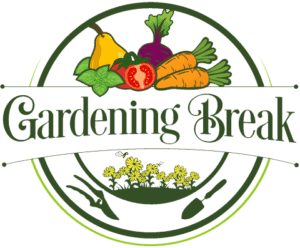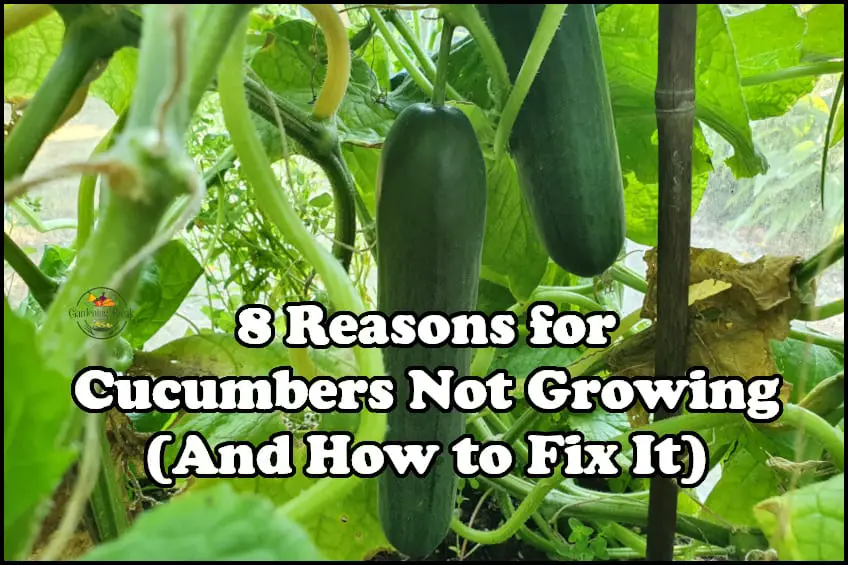
It can be a bit alarming if your cucumber plants aren’t growing as fast as you expected or maybe even not growing at all. It can be difficult to know where to begin but don’t worry, because there is always an explanation and a way to solve or avoid the problem, which is why I have written this article.
To make it as easy as possible to figure out why your cucumbers are not growing, I have made this list with the most likely reasons. I have, of course, also explained how to solve the issues and avoid them in the future.
1. Incorrect Watering Can Cause Cucumbers to Stop Growing
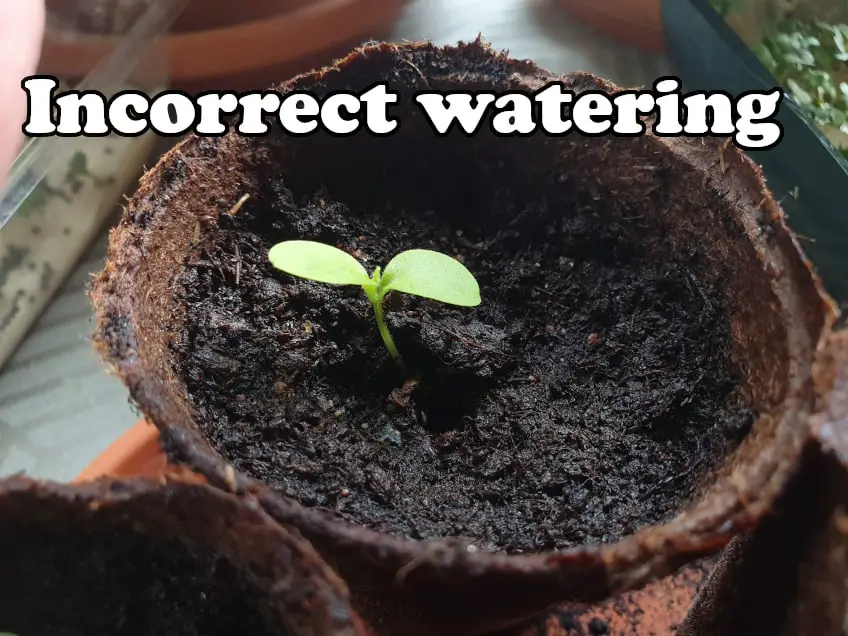
Incorrect watering is probably the most common reason why cucumber plants don’t grow very well (or don’t grow at all), which is why I want to cover it first. Incorrect watering generally only causes cucumbers to stop growing when the problem is severe, so if that is the problem, you need to act fast.
The two primary watering-related mistakes you can make, which can cause your cucumbers to grow slower or stop growing entirely are overwatering and underwatering.
Cucumbers need to grow in moist soil to thrive. If you underwater them, the soil can dry out, and if you overwater them, the soil stays wet and soggy for too long. Both will damage the roots and even kill the plant after some time.
How to check if incorrect watering is the problem
To figure out if incorrect watering is the reason why your cucumbers are not growing, you need to check the soil. If it is completely dry, you are underwatering your cucumbers. If the soil stays wet and soggy for a long time after you water your plants, you are most likely overwatering them. Cucumber plants also begin wilting and looking droopy when they are getting too much or too little water.
How to solve the problem and avoid it in the future
Cucumbers thrive when they grow in moist soil, so it is all about finding the right balance. The easiest way to maintain a good level of moisture in the soil is to water only when the top of the soil looks and feels dry. It is important that you don’t let more than just the top inch or so dry out since the roots might start drying out, which they shouldn’t.
If your cucumbers are underwatered, you just have to water them more. Be very careful that you don’t start overwatering them, though.
If your cucumbers are overwatered, allow the top of the soil to dry out (but only the top), and then start watering carefully. Keep watering only when the top of the soil is dry. If possible, increase the amount of sunlight the plant gets. In severe cases, you might need to transplant the cucumber plant into a larger pot with more soil. Bottom watering can also be an effective way to reduce the risk of overwatering potted cucumbers (read more here).
2. Cucumbers Stop Growing When They Finish Producing Seeds
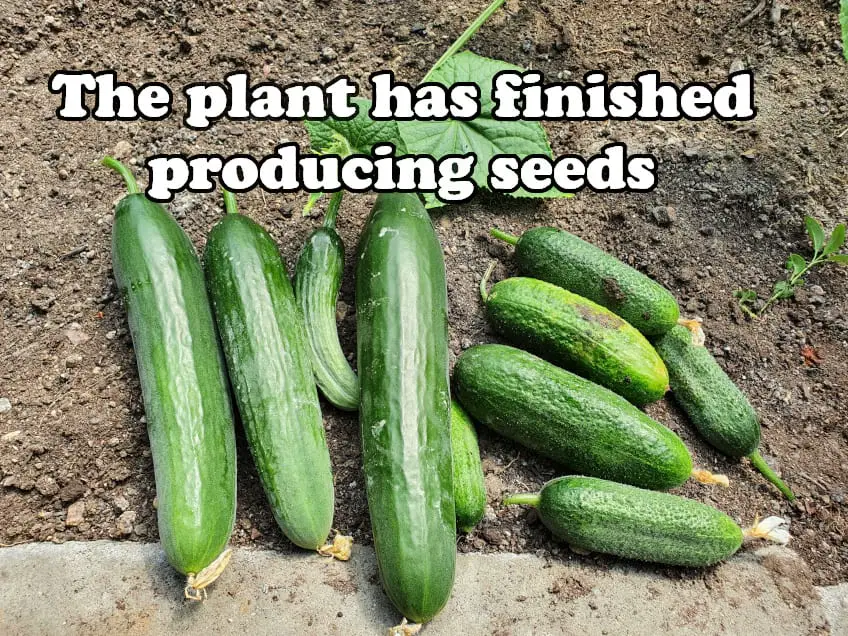
A very common reason why cucumbers stop growing and producing fruit is that the plant has finished its reproductive cycle, which means it has finished producing seeds.
Once cucumbers become over-ripe and go to seed, the plant will stop growing and producing more fruit because it has “finished its job”, which was to complete the reproductive cycle.
I remember wondering why my cucumber plants only produced one or a few cucumbers and then stopped growing when I first started growing them. Now I know that it was because the plants finished producing seeds and therefore stopped growing more since they had finished their job. I also know how to avoid it now, though, so keep reading.
You can read more about how long cucumber plants live and produce fruit in the article on this link, where I also share some tips on how to make them live for longer.
How to check if this is the problem
When cucumbers go to seed, the fruit turns yellow and starts tasting bitter. The plant will stop growing and producing more fruit soon thereafter. So the easiest thing you can do to see if your cucumbers have gone to seed is to look at the fruit.
How to solve the problem and avoid it in the future
Unfortunately, there is no way to save a cucumber plant that has finished its reproductive cycle, so you might as well pull up the plant and sow something else.
Luckily, it is pretty easy to avoid the problem and keep your cucumbers growing and producing for months. All you have to do is harvest the fruit before it becomes over-ripe. Even when you don’t need or want the fruit right now, because it is better to pick and waste one or a few of the fruits than to have the plant stop growing and producing entirely.
The fruit should look similar to the ones in the photo above, which I grew and harvested in my greenhouse.
3. Cucumbers That Don’t Have Enough Space Stop Growing
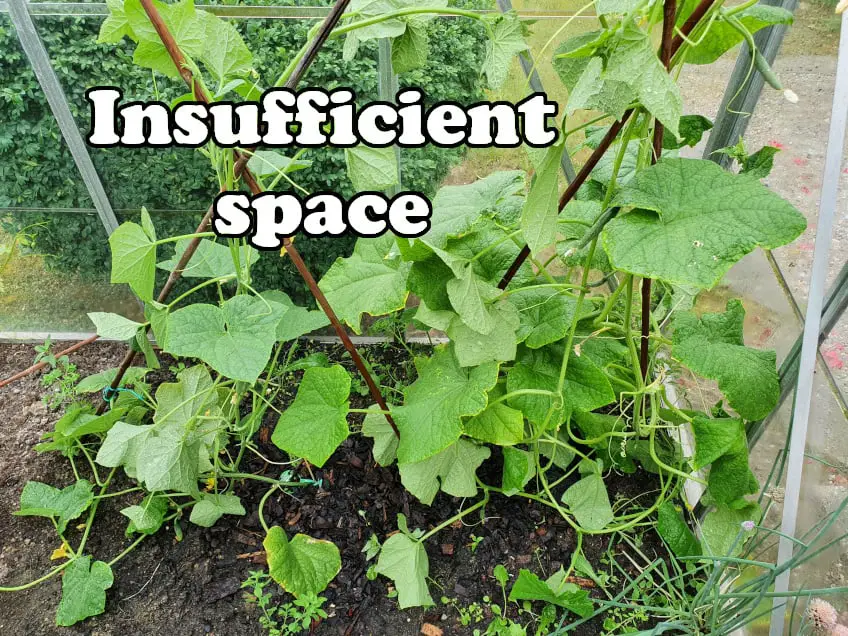
Like any plant, cucumbers need enough space to grow properly. Both above and below the ground.
If cucumber plants run out of space underground, they become rootbound, which, as the name indicates, means that the roots don’t have more room to grow. When this happens, they can’t obtain water and nutrients efficiently, which can cause the plant to stop growing. This is much more likely to happen to cucumbers growing in pots than in the ground.
If cucumbers run out of space above ground, for example, if you plant them too densely, the risk of pests and diseases spreading between plants is much higher than if they had more space. This is just one of many things that can happen if plants don’t have enough space, though. You can read more about what happens if plants are overcrowded in the article on this link.
Cucumber plants can get very large, so you need to think ahead when you plant them. Especially if you grow them in a greenhouse, like I did with the two plants in the photo above, since the space is usually more limited than outside. Cucumbers can grow really well both in greenhouses and outside and both have their advantages, which I compare in the article on this link.
How to check if insufficient space is the problem
There should always be empty air all the way around your cucumber plants. If there isn’t, they might be running out of space.
Potted cucumbers can become rootbound if the roots fill up the whole pot. The best way to check this is to carefully lift the plant a bit out of its pot to see if the roots take up the whole space.
How to solve the problem and avoid it in the future
If your cucumbers are running out of space above the ground, you have to prune them or other nearby plants to make sure air can flow freely around them.
If you are growing cucumbers in a pot and they have become rootbound, you have to transplant them either into a larger pot with more soil or into the ground. That way, the roots have room to keep growing.
I have an article on this link, where I go a lot more into depth with how you can tell if plants are overcrowded and how to save them.
4. Poor Soil Can Make Cucumber Plants Grow Slowly
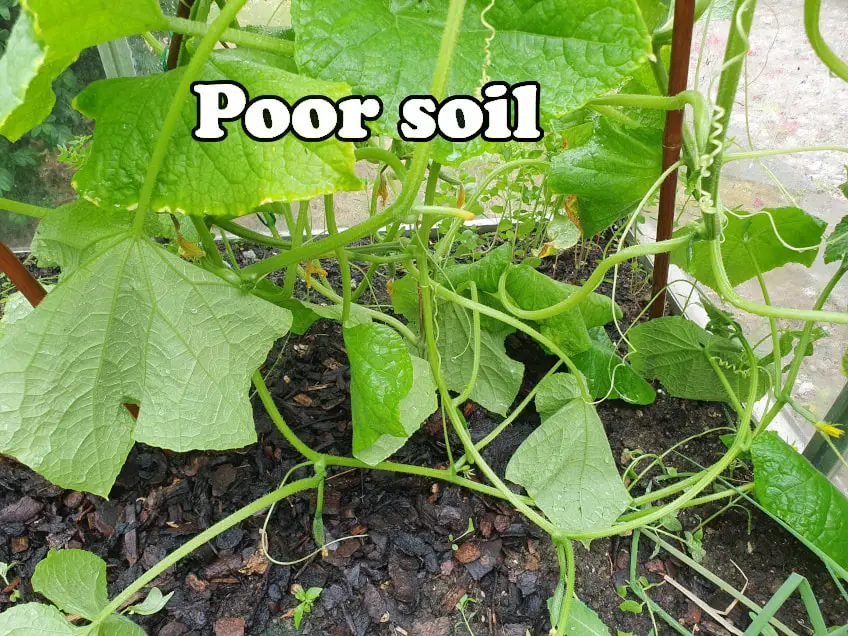
Good soil is one of the most important factors that determine how well (and how much) cucumber plants will grow.
If the soil is too nutrient-poor or runs out of the nutrients the plants need, they might stop growing entirely.
The soil type also determines how easily the roots can grow and spread and how well water can run through the soil. Poor-draining soil significantly increases the risk of root damage since water will stay around the roots for a long time. This can cause the plant to stop growing.
How to check if the soil is the problem
The first thing you should do to check your soil is to see if it contains small pieces of organic matter such as small sticks, branches, stems, or leaves that are being broken down.
Nutrient-rich soil also tends to be a lot darker than poor soil, so if your soil looks very light or almost gray, it is probably not very well-suited for growing cucumbers.
Another trick I like to use is to take a good handful of the soil and squeeze it. It should stay in a ball without breaking, but then break apart pretty easily once you start poking it. If the soil doesn’t stick together, it might be too poor. If, on the other hand, the soil ball doesn’t break apart when you start poking it, it might contain too much clay which is bad for drainage and makes it harder for the roots to grow.
How to solve the problem and avoid it in the future
Cucumbers need to grow in nutrient-rich, well-draining soil to thrive. The nutrients generally come from organic matter in the soil and the drainage can come from a high sand content. It can also be a very good idea to add mulch on top of the soil like I have done in the photo above, as it can help retain moisture and over time breaks down and adds organic matter to the soil.
If you want to learn more about how to create the best soil mix for cucumbers as well as how to test the soil you have and improve it if needed, you should read the article on this link.
5. Lack of Sunlight Can Cause Cucumber Plants to Not Grow
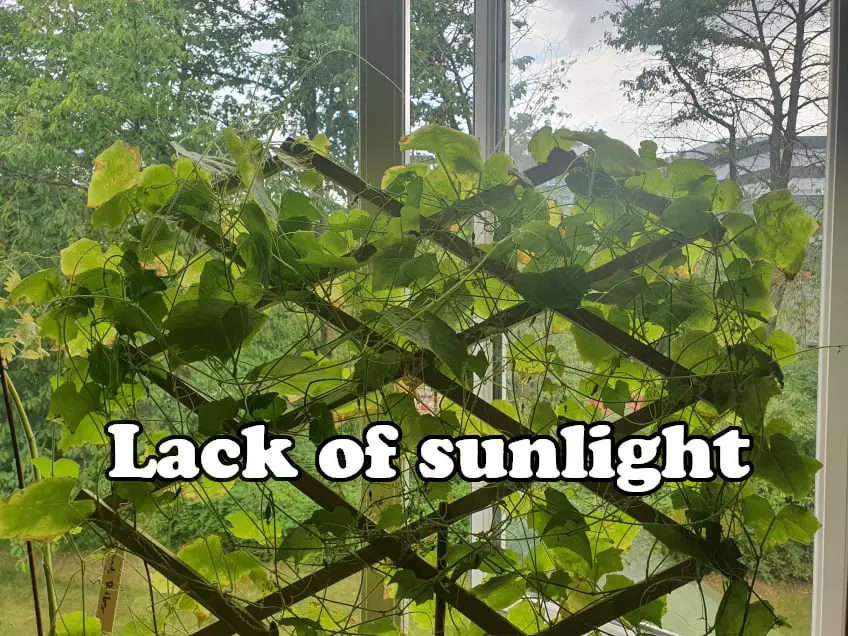
As a plant that is native to the tropics, cucumbers need a lot of sunlight to grow well, so if your plants aren’t growing, it might simply be because they aren’t getting the sunlight they need.
At one point, I tried to grow cucumbers indoors near a sunny window (which is what you see in the photo above). They started fine but stopped growing relatively fast. The soil was fine, I was watering correctly, and making sure there were no pests and diseases. They just didn’t get enough sunlight, so they stopped growing.
It is technically possible to grow cucumbers indoors, but you need a spot that gets a lot of sunlight and ideally from multiple angles.
How to check if lack of sunlight is the problem
Like most other plants, cucumbers, and especially cucumber seedlings will stretch and get long and leggy if they don’t get enough sunlight. Another common sign is wilting, but keep in mind that plants also wilt for other reasons such as overwatering or underwatering.
How to solve the problem and avoid it in the future
If your cucumbers aren’t getting enough sunlight, you have to either move them to a sunnier location or move whatever is casting shade on them. If other plants are casting shade on your cucumbers, you can consider pruning them. If a building or something else you can’t move is casting shade on your plants, consider finding a new spot for them next year.
6. Low Temperatures Will Cause Cucumbers to Stop Growing
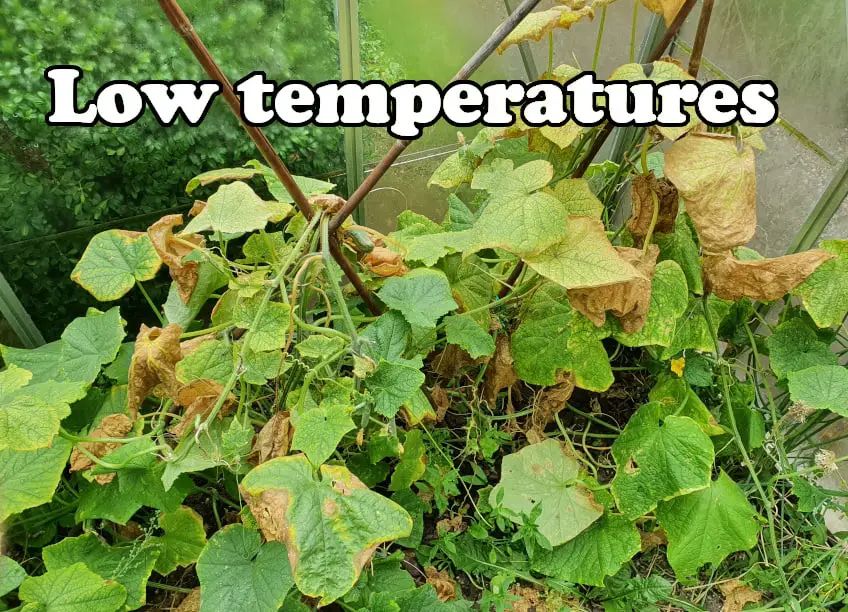
As a native to the tropics, cucumbers need high temperatures to grow and thrive. This means that the timespan in which we can grow cucumbers is often relatively limited and once fall and winter come, our plants will stop growing and die pretty quickly.
When it gets too cold, the plants will stop growing and start showing signs that it is starting to die.
The leaves on your cucumber plants will begin to turn yellow and brown and dry out like my plants in the photo above when it gets too cold. Yellowing leaves can be caused by many different things, though, so if you see that on your cucumber plants, I encourage you to read this article where I explain what to do.
How to check if the temperature is the problem
The easiest way to figure out if the temperature is a problem for your cucumbers is to figure out how cold it gets at night. According to this article from University of Georgia Extension, cucumbers grow best at temperatures between 75-85° F (about 24-29° C) and won’t tolerate frost.
So if there is frost at night, chances are your cucumbers won’t grow more at all and are actually dying. Lower temperatures mean slower growth and when the temperature gets to around 50° F (10° C), the plants will grow very slowly.
How to solve the problem and avoid it in the future
If you grow your cucumbers in pots, you can move them somewhere warmer, for example into a greenhouse or near your house since some heat usually escapes, which can help keep the plants warmer.
I like to grow cucumbers in my greenhouse since they are kept warmer than outside. My cucumbers usually live for about a few weeks to a month longer in my greenhouse than outside, but that’s not always the case.
7. Cucumber Seeds That Are Too Old Might Not Germinate
If your cucumber seeds aren’t even germinating, it might be because they are too old.
Most seeds last for about 1-5 years if stored correctly and the germination rate decreases with time.
According to this article by Erin Mahaney from Agriculture and Natural Resources, University of California, cucumber seeds generally last for 5 years if stored correctly.
The best way to store seeds to keep them good for a long time is to keep them in a dry, relatively cool, and dark place.
If your cucumber seeds are more than five years old, you shouldn’t expect them to germinate. If they are a few years old (but less than five), it can be a good idea to use a few seeds instead of just one to increase the chance that at least one will germinate. If more than one germinates, just remove any extra plants.
8. Use the Right Fertilizer to Make Cucumbers Grow Faster
The last potential reason why your cucumbers aren’t growing that I want to cover is that they might not have the nutrients they need.
Most of the nutrients for your cucumbers should come from the soil (see point 4), but it can sometimes be a great idea to use some fertilizer.
Vegetable fertilizers usually come with an NPK value which indicates the concentration of nitrogen, phosphorus, and potassium in the fertilizer.
You can get some very specialized fertilizers that are almost designed specifically for your situation, but then you would have to talk to an expert who knows about the soil in your area.
Alternatively, you can use a fertilizer with an NPK value of 10-10-10 or 20-20-20. This is considered a good all-round vegetable fertilizer. A lot of the time, this is what I use for cucumbers.
If you use fertilizer for your cucumbers (and other plants for that matter), you have to keep in mind that you can overfertilize them, which can kill them. One of the first signs of overfertilizing is that the lower leaves start to turn yellow.
